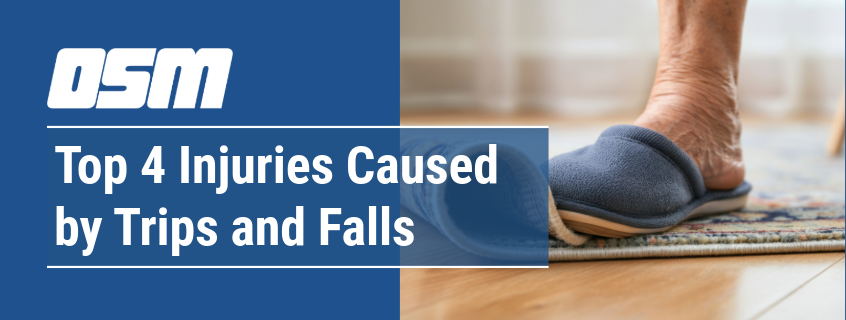Top 4 Injuries Caused by Trips and Falls
Article featured on South Shore Orthopedics
Millions of Americans each year trip and fall, resulting in injuries ranging from mild to very severe. The sudden and unpredictable nature of these accidents puts anyone, regardless of age or overall health, at risk of suffering an injury that requires treatment for proper recovery and if delayed, could lead to serious health complications. For this reason, even if your fall seems mild, it’s always best to consult a physician. Here are five of the most common fall injuries of which you should be aware.
1. Head Injury (concussion or TBI)
While any blunt force to the head could be classified as a medical emergency and should warrant a doctor’s visit just to be safe, there are clear signs of a more severe head injury such as a concussion or a traumatic brain injury. Some of the clearest signs of a serious injury to the head are loss of consciousness, slurred speech, blurry vision, minor memory loss and confusion, and nausea and vomiting after trauma. These symptoms could point towards serious medical issues such as bleeding on the brain and irreversible trauma that can quickly and permanently impair your abilities and quality of life. But, do not count on these symptoms. Some serious head injuries caused by falls show only minor signs at first, such as pain, swelling, and a minor headache. This is why hitting your head is one of the deadliest types of fall injury: because the problem can be much worse than it appears.
2. Broken Bones/Fractures
One of the most common fall injuries is a broken or fractured bone. When ignored these injuries can result in a break healing incorrectly, leading to chronic pain, restricted usage, and other negative complications. Some small fractures can be left to heal on their own, while most breaks will require a cast and/or surgery. One of the most common and debilitating fractures (especially for older people) is the hip fracture. It will often require a hip replacement, extensive hospital and rehabilitation time, and a lot of pain. But all of these problems become a lot more serious and sometimes fatal when not given immediate medical attention. Given the nature of fall injuries, breaks will likely always occur with a serious fall and should be anticipated even in less serious incidents.
3. Soft Tissue Injuries
The soft tissue is often damaged during a fall injury, as the extremities can get twisted, bent, or over-extended beneath the bodies descending weight. Many of these injuries will result only in soreness such as a minor ankle or wrist sprains. But fall injuries can also result in torn ligaments and tendons that often require immediate surgery. These more serious problems can sometimes lead to nerve damage, chronic pain, and even restricted mobility without proper and swift care. And unfortunately, much like the injuries listed previously, soft tissue trauma often presents little to no symptoms immediately following a fall, making it difficult to assess the seriousness of the situation.
4. Shoulder/Rotator Cuff Injury
Oftentimes during a trip and fall injury, the shoulder will receive a lot of impact, as the arm is normally extended in an attempt to regain balance or brace for impact. In this case, the shoulder can be violently twisted or fallen on while the arm is outstretched, resulting in a dislocated shoulder and/or a torn rotatory cuff. The extent of these injuries could require anything from a RICE regiment to surgery to restore mobility into the shoulder/arm area. The symptoms should appear soon following the fall, but an assessment of what treatment would be best is highly recommended. Just like the other types of injuries on this list, there is some recovery time (for a rotary cuff, this may be a few months) necessary for full function again after trauma to the shoulder following a fall.
The Orthopedic & Sports Medicine Center of Oregon is an award-winning, board-certified orthopedic group located in downtown Portland Oregon. We utilize both surgical and nonsurgical means to treat musculoskeletal trauma, spine diseases, foot and ankle conditions, sports injuries, degenerative diseases, infections, tumors and congenital disorders.
Our mission is to return our patients back to pain-free mobility and full strength as quickly and painlessly as possible using both surgical and non-surgical orthopedic procedures.
Our expert physicians provide leading-edge, comprehensive care in the diagnosis and treatment of orthopedic conditions, including total joint replacement and sports medicine. We apply the latest state-of-the-art techniques in order to return our patients to their active lifestyle.
If you’re looking for compassionate, expert orthopedic and podiatric surgeons in Portland Oregon, contact OSM today.
Phone:
503-224-8399
Address
17355 Lower Boones Ferry Rd Suite 100A
Lake Oswego, OR 97035
Hours
Monday–Friday
8:00am – 4:30pm



